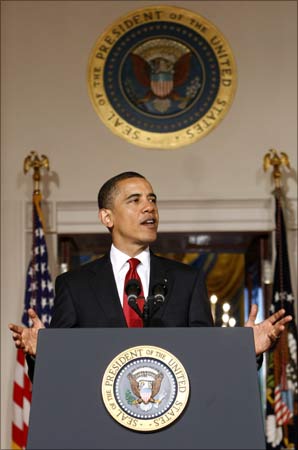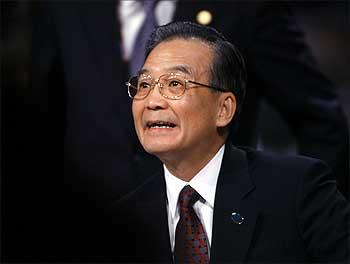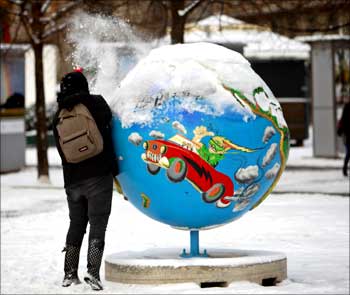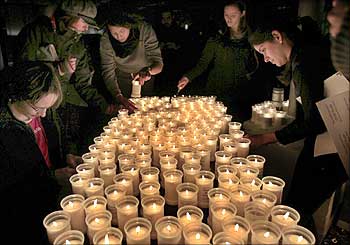
With no signs of a possible deal at the Climate Summit here, Prime Minister Manmohan Singh on Friday made it clear that future negotiations on tackling the menace should be based on equitable burden sharing as enshrined in Kyoto Protocol and Bali mandate.
Addressing the crucial final day of the summit, Singh said the outcome of the summit may fall short of expectations and warned against any dilution of the principles of UNFCCC, particularly of "common but differentiated" responsibilities.
"Future negotiations must continue on the basis of 1997 Kyoto Protocol and 2007 Bali Action Plan and parties (rich nations) should deliver on their commitments for emission cuts. Kyoto Protocol should continue to stand as a valid legal instrument," Singh said.
He said that it would go against international public opinion if "we succumb in its replacement by a new and weaker set of commitments." "We have all worked hard to reconcile our different points of view. The outcome may well fall short of expectations, nevertheless it can become a significant milestone."
"I therefore support calls for subsequent negotiations towards building a truly global and genuinely collaborative response to climate change being concluded during 2010," Singh said.
Click NEXT to read further. . .

Earlier, US President Barack Obama said at the Copenhagen meet: "It is in our mutual interest to achieve a global climate accord. There is no time to waste, we should act, not talk."
He said that financing to developing nations is a must and refers to America's pledge to raise $100 billion by 2020, but asserts that it will be done 'only if' it is part of a broader accord. Mitigation, transparency, finance -- it is a clear format, he said.
Obama said that there should be a mechanism to monitor emission reduction actions, exchange of information and transparency. He said that this should not be intrusive or impinge upon sovereignty.
Countries must work together on national actions and keep checks on those commitments; a deal that does not include sharing information will be a hollow victory, he added.

Earlier, Chinese Premier Wen Jiabao said that the principle of common but differentiated responsibility must be adhered to and developed countries must honour their commitments.
Wen said that China takes climate change 'very seriously' and regards it as an important strategic task. He vowed that China will not only achieve but exceed its voluntary climate action targets.
Now it is the time for united action, countries should show common sense, compromise and courage, UN Secretary General Ban Ki-moon tells the Copenhagen climate summit.
No headway was made in climate talks with the United States and China refusing to budge from their positions on emission cuts as negotiators struggled on Friday to strike a face-saving deal to tackle global warming.
The Indian prime minister also pointed out that majority of the countries do not support any renegotiation or dilution of the principles of UNFCCC, particularly common but differentiated responsibilities.

He said that majority of the countries do not support any renegotiation or dilution of the principles of UNFCCC.
"To settle for something that could be seen as diminished expectations and diminished implementations would be in our view a very wrong message to emerge from this conference," the prime minister told the high-level segment of the meet.
India has a vital stake in the success of negotiations as it is likely to be among the most affected by climate change, Singh said.
He asserted that future negotiations must continue on the basis of 1997 Kyoto Protocol and 2007 Bali Action Plan and maintained that parties to Kyoto Protocol should deliver on their commitments for emission cuts.
"Kyoto Protocol should continue to stand as a valid legal instrument. It would go against international public opinion if we succumb in its replacement by a new and weaker set of commitments," Singh said.
The Protocol, under which developed countries are legally bound to meet specific emission cut targets but made no such demands from developing countries, expires in 2012.

"Each one of us gathered here today acknowledges that those most affected by climate change are the least responsible for it," Singh said and underlined the need to address "glaring injustice" to countries in Africa, least developed nations and small island nations.
He said any agreement must respect needs of development and growth in developing nations. "Any new climate regime will only have moral authority and credibility only if it acknowledges that every citizen of the world has equal entitlement to global atmospheric space," he said.
Indications of an impasse in the talks came from Swedish Environment Minister Andreas Carlgren who said no agreed text had emerged ahead of the meeting of 110 world leaders.
"It is now up to the world leaders to decide," he said while blaming China and the US for the deadlock.
Amid the hard negotiations, Prime Minister Manmohan Singh [ Images ] met his Chinese counterpart Wen Jiabao to consolidate the position of developing countries.
During his meeting with Wen, Singh recalled that the two countries have been cooperating at various fora, including the G-20.
"We need to continue the cooperation," said the Prime Minister, who arrived in the Danish capital late last night to take part in the high-level segment UN climate talks.
India and China are the key members of the BASIC bloc-- with others being Brazil and South Africa -- which along with other developing countries have been resisting attempts by the rich nations to set aside the 1997 Kyoto Protocol.

The protocol sets legally binding greenhouse gas emissions reduction targets for industrialised nations. It also has a strong compliance mechanism which penalises the rich nations if they do not meet emission reduction targets agreed upon by them.
US President Barack Obama also arrived in the Danish capital to join world leaders in giving a final push to an ambitious deal. The leaders will consider two documents-- one on long- term cooperation under the framework convention and another on the Kyoto Protocol.
"There will be some political declaration," Environment Minister Jairam Ramesh told reporters.
Amid last-ditch efforts to salvage the climate summit, the Danish government came out with a draft accord that skipped putting more onus on developed countries on emission cuts and mitigation targets but promised $100 billion in finance to developing countries by 2020.
The Association of Small Island States, however, said the $100 billion figure was an old figure and not enough.
The draft, which may undergo several revisions, reflected the key Indian demand that only action involving international finances are open to scrutiny.
Singh, who held hectic parleys with the Indian team after arriving at the Bella Centre accompanied by Foreign Secretary Nirupama Rao and his Special Envoy Shyam Saran, has made it clear that climate change cannot be addressed by perpetuating the poverty of developing countries.
The Danish draft was circulated after marathon negotiations among key players that stretched overnight.
The document also refers to containing the global rise in temperature to 2 degrees Celsius before the greenhouse gases stabilise, in consonance with the Indian position.
Small island states, most vulnerable to global warming, have demanded that the rise be limited to 1.5 degrees Celsius as compared to pre-industrial times.
Amid last ditch efforts to salvage the climate summit, the Danish government on Thursday came out with a draft accord that skips putting more onus on developed countries on emission cuts and mitigation targets but promises $100 billion in finance to developing countries by 2020.
The draft, which may undergo several changes during the negotiations, reflects the key Indian demand that only action involving international finances are open to scrutiny.